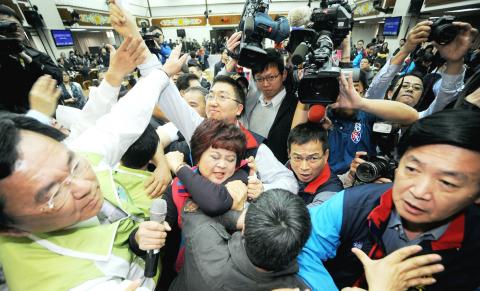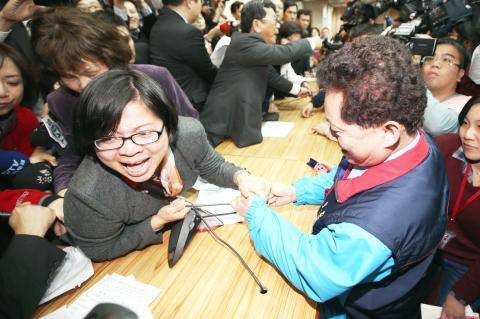The second day of a legislative meeting scheduled to review the cross-strait service trade pact was marked with clashes and condemnations between lawmakers of the two political camps.
“There may be differences in opinion between different parties, but these differences should be resolved through negotiation, not violence,” Chinese Nationalist Party (KMT) caucus whip Lin Hung-chih (林鴻池) told a press conference yesterday. “We condemn the Democratic Progressive Party [DPP] caucus for using violence against our caucus office director Chiang Kui-fang [江桂芳].”
Lin was referring to a scuffle which occurred in the afternoon, when DPP Legislator Chiu Yi-ying (邱議瑩) attempted to unplug a loudspeaker box belonging to the KMT caucus, as KMT lawmakers were speaking through loudspeakers, trying to interrupt the meeting.

Photo: Liu Hsin-de, Taipei Times
“I did not use violence against Chiang, I was trying to stop the KMT from interrupting the meeting. Chiang wanted to stop me from what I was doing, and I had to defend myself,” Chiu said.
As the tussle between Chiu and Chiang ensued, legislators from both camps rushed over, adding to more pushing and shoving.
Amid the chaos, KMT Legislator Alicia Wang (王育敏) collapsed and was rushed to the health center.

Photo: CNA
She was later diagnosed with several bone fractures in her arms and feet.
The conflict erupted as soon as DPP Legislator Chen Chi-mai (陳其邁), who presided over the meeting, announced the beginning the meeting at 9am.
About one minute before the official start, Lin and KMT legislators delivered a petition, asking that the meeting to reject the official record of Wednesday’s review of the service trade pact, saying that there should not be a meeting transcript since nothing happened during the meeting.
Chen refused to take the petition, saying the meeting had not started. However, after announcing the beginning of the meeting, he confirmed there were no issues with the transcript of the previous day, despite the verbal and written protest from KMT lawmakers.
As the meeting degenerated into chaos, Chen announced that the meeting would go into recess, and left the podium.
When Legislative Yuan staffers stepped down from the podium with Chen, several KMT legislators — notably Alex Fai (費鴻泰) — ran after them, trying to stop them from leaving, and accused them of not being neutral.
DPP legislators Chen Ting-fei (陳亭妃) and Lee Chun-yi (李俊俋) quickly moved to push Fai away, asking him “not to give staffers trouble.”
The meeting was again paused after the conflict between Chiu and Chiang, with Chen and his DPP colleagues again leaving the meeting room.
As Chen and DPP lawmakers did not return at the scheduled ending of the meeting at 5:30pm, KMT lawmakers declared the meeting adjourned, and said the caucus will hold meetings to review the services trade pact next week, when KMT Legislator Chang Ching-chung (張慶忠) is to serve as the rotating president of the Internal Administration Committee.
Meanwhile, the DPP caucus accused the KMT of resorting to lies and violence to block the review procedure.
Chen Chi-mai said the KMT caucus has been doing everything it could, including kicking Legislative Yuan staffers and blaming them for violation of neutrality and stealing away the registration form so that lawmakers could not speak in order, to compromise the meeting.
He also rejected the KMT’s claim that he failed to follow regulations and ignored Lin Hung-chih’s motion to reaffirm the proceedings.
“I was ready to accept [Lin’s] proposal, but he seemed to have a change of heart and hesitated. The next thing I knew, the scuffle between lawmakers began and he was never able to propose it again,” Chen Chi-mai said.
Additional reporting by Chris Wang

Alain Robert, known as the "French Spider-Man," praised Alex Honnold as exceptionally well-prepared after the US climber completed a free solo ascent of Taipei 101 yesterday. Robert said Honnold's ascent of the 508m-tall skyscraper in just more than one-and-a-half hours without using safety ropes or equipment was a remarkable achievement. "This is my life," he said in an interview conducted in French, adding that he liked the feeling of being "on the edge of danger." The 63-year-old Frenchman climbed Taipei 101 using ropes in December 2004, taking about four hours to reach the top. On a one-to-10 scale of difficulty, Robert said Taipei 101

Taiwanese and US defense groups are collaborating to introduce deployable, semi-autonomous manufacturing systems for drones and components in a boost to the nation’s supply chain resilience. Taiwan’s G-Tech Optroelectronics Corp subsidiary GTOC and the US’ Aerkomm Inc on Friday announced an agreement with fellow US-based Firestorm Lab to adopt the latter’s xCell, a technology featuring 3D printers fitted in 6.1m container units. The systems enable aerial platforms and parts to be produced in high volumes from dispersed nodes capable of rapid redeployment, to minimize the risk of enemy strikes and to meet field requirements, they said. Firestorm chief technology officer Ian Muceus said

MORE FALL: An investigation into one of Xi’s key cronies, part of a broader ‘anti-corruption’ drive, indicates that he might have a deep distrust in the military, an expert said China’s latest military purge underscores systemic risks in its shift from collective leadership to sole rule under Chinese President Xi Jinping (習近平), and could disrupt its chain of command and military capabilities, a national security official said yesterday. If decisionmaking within the Chinese Communist Party has become “irrational” under one-man rule, the Taiwan Strait and the regional situation must be approached with extreme caution, given unforeseen risks, they added. The anonymous official made the remarks as China’s Central Military Commission Vice Chairman Zhang Youxia (張又俠) and Joint Staff Department Chief of Staff Liu Zhenli (劉振立) were reportedly being investigated for suspected “serious

Nipah virus infection is to be officially listed as a category 5 notifiable infectious disease in Taiwan in March, while clinical treatment guidelines are being formulated, the Centers for Disease Control (CDC) said yesterday. With Nipah infections being reported in other countries and considering its relatively high fatality rate, the centers on Jan. 16 announced that it would be listed as a notifiable infectious disease to bolster the nation’s systematic early warning system and increase public awareness, the CDC said. Bangladesh reported four fatal cases last year in separate districts, with three linked to raw date palm sap consumption, CDC Epidemic Intelligence